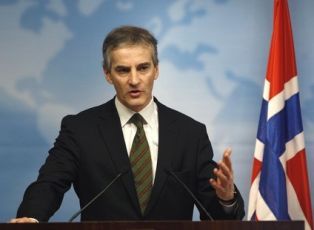Sudan in critical stage, requires AU intervention-envoy
By Julius N. Uma
June 5, 2010 (JUBA) — Sudan’s much anticipated referendum is just months away, but preparations for this historic event remains a critical issue that requires the intervention of African Union (AU) members, Mr. Jonas Gahr Støre, the Norwegian Foreign Minister has observed.

Mr. Støre, the third Norwegian Minister to visit Sudan, made these remarks during a courtesy call paid to the semi-autonomous region, where he held talks with President Salva Kiir, his Vice Dr. Riek Machar, Energy and Mining Minister, Mr. John Luk, the SPLM Secretary General, Mr. Pagan Amum and UNMIS head Mr. David Gressly.
Describing Sudan’s peace process as being at a “decisive and critical phase”, Mr. Støre urged members of the international community to consider the referendum as a key issue in the implementation of the 2005 Sudan’s Comprehensive Peace Agreement (CPA).
“The peace process in Sudan is in a decisive and critical phase. We can already see that this will be a key issue on the international agenda the next 12 months,” Mr. Støre said.
According to the Norwegian Foreign Minister, if Southern Sudanese opted to vote for their independence, the process must be peaceful, and that both the north and south should cooperate, particularly on the distribution of oil revenues.
“The parties [SPLM and NCP] urgently need to start negotiations on future cooperation,” Mr. Støre advised.
WHO IS JONAS GAHR STØRE?
Born on 25 August 1960 in Oslo, Norway to a ship-owner, Jonas Gahr Støre attended the Oslo-based Berg School before joining a naval officer training at the Royal Norwegian Naval Academy. He later studied Political Science in Paris before enrolling as a PhD student at the London School of Economics, but withdrew after a few weeks, as he decided not to pursue an academic career.
Mr. Støre started his professional career as a teaching fellow in the Harvard Negotiation Project at Harvard Law School in 1986. This was followed by a position as researcher at the Norwegian School of Management (1986–1989) and special adviser at the Norwegian Office of the Prime Minister from 1989 to 1995. He was Director General for International Affairs at the Office of the Prime Minister from 1995 to 1998, and he subsequently held the position of ambassador in the Norwegian Delegation to the United Nations Office at Geneva.
However, his first major international position was as Executive Director (Chief of Staff) in the World Health Organization under the leadership of Gro Harlem Brundtland. This was followed by a year as State Secretary and Chief of Staff for Prime Minister Jens Stoltenberg in the first cabinet Stoltenberg from 2000 to 2001. Before taking up the position as Foreign Minister he was Executive Chairman of the think tank ECON Analyse from 2002 to 2003 and Secretary General of the Norwegian Red Cross from 2003 to 2005.
A member of the Norwegian Labour Party, Støre became the Norwegian Minister of Foreign Affairs in October 2005, having been appointed to Jens Stoltenberg’s second cabinet.
(ST)

Dinka Boy
Sudan in critical stage, requires AU intervention-envoy
Dear Southerners,
Mr.Jonas Gahr Store understood the implications of referendum that will take place next year. This referendum is not that easy as many of people think because the NCP under the dictatorship rules is trying to complicate the process.
The Goss need to be ready next year because the possibilities of uncertainity is so obvious. We South Sudanese must be ready for referendum instead of talking about the past April election. We need to stop weak heart which always favor the enemy side instead of your own people. SPLM/A must hunt those rebels who want to deface the interest of South because of their self-interest before referendum. If we South Sudanese are proud to be the new nation,then we should be free from political prostitutions between the parties. I know why South Sudan did not captured the whole Sudan by force. It’s because we have weak heart who love enemy more than their own people. Alot of South Sudanese where on the side of Jallaba since the war instead of them to be with their brothers and sisters.